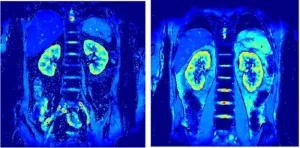(Press-News.org) While coronary heart disease and diabetes are often seen in the same patients, a diagnosis of diabetes does not necessarily mean that patients also have coronary heart disease, according to a new study from researchers at Intermountain Health in Salt Lake City.
The Intermountain study found that proactively screening patients with diabetes 1 and 2 for coronary heart disease who have not shown symptoms of heart problems does not improve long-term mortality rates, nor does it lower the chance of them having a heart attack or stroke in the future.
“Our study found that doing these kinds of screenings on patients doesn’t make any marked difference in their long-term survival rates,” said J. Brent Muhlestein, principal investigator of the study and co-director of cardiovascular research at Intermountain Health.
“Instead, results of our study reinforce that we should be focusing on other proven interventions for people with diabetes, like medication management, diet and exercise, to help these patients lead long and healthy lives,” he added.
Findings from the Intermountain Health study were presented at the American Heart Association’s Scientific Sessions 2024 in Chicago on Monday, November 18.
For the study, Intermountain Health researchers examined data from FACTOR-64 study, a randomized clinical trial of 900 people with type 1 or type 2 diabetes for at least three to five years without coronary artery disease symptoms.
Of these patients, 452 were screened with a coronary computed tomography angiography (CCTA), which uses a powerful X-ray to make a 3D image of the heart. Researchers compared these patients with a control group of 448 people who were treated with standard optimal diabetes care guidelines.
Enrollment occurred between July 2007 and May 2013, and followed up on in May 2024.
Researchers found that using CCTA to screen for cardiovascular disease did not significantly affect the rates of all-cause mortality or of non-fatal heart incidents, like heart attack and stroke. This was true when researchers initially followed up four or five years after the CCTA screening, and again at 12 years.
“These findings should discourage the use of CCTA for screenings in diabetes patients who do not show any symptoms of heart disease,” said Dr. Muhlestein.
“While our study showed that screening for coronary heart disease with CCTA won’t make any difference, it did show that if patients carefully medically manage their diabetes, they may live almost as long as somebody who does not have diabetes, which wasn’t the case before,” said Dr. Muhlestein. “This study shows that, even over an extended period of time, a screening like this can’t replace those kinds of critical behaviors.”
###
END
Different species of seabirds can coexist on small, isolated islands despite eating the same kind of fish. A researcher at Uppsala University has been involved in developing a mathematical model that can be used to better understand how this ecosystem works.
“Our model shows that coexistence occurs naturally when species differ in their ability to catch fish and to efficiently fly long distances to the area where they catch fish,” says Claus Rüffler, Associate Professor of Animal Ecology at Uppsala University.
Seabirds can breed in very large colonies, sometimes consisting of several hundred thousand pairs. Ecologists working ...
ANN ARBOR, Mich. – Many parents are all too familiar with angry outbursts from their children, from sibling squabbles to protests over screen time limits.
But some parents may find it challenging to help their kids manage intense emotions. One in seven think their child gets angrier than peers of the same age and four in 10 say their child has experienced negative consequences when angry, a new national poll suggests.
Seven in 10 parents even think they sometimes set a bad example of handling anger themselves, according to the University of Michigan Health ...
The scientific debate around the installation of a massive underwater curtain to protect Antarctic ice sheets from melting lacks its vital political perspective. A Kobe University research team argues that the serious questions around authority, sovereignty and security should be addressed proactively by the scientific community to avoid the protected seventh continent becoming the scene or object of international discord.
A January 2024 article in Nature put the spotlight on a bold idea originally proposed by Finnish researchers to save the West Antarctic ...
Research into new bandaging aims to ease the agony experienced by those living with genetic skin condition Epidermolysis Bullosa (EB), commonly referred to as 'butterfly skin'.
Scientists at Maynooth University in Ireland are leading research into whether ‘spray on, wash off’ bandages will be a viable alternative to those currently used, which can cause severe pain when applied and removed.
EB, which affects over 500,000 children and adults worldwide including 5,000 in the UK and 300 ...
When pain signals are passed along the nervous system, proteins called calcium channels play a key role. Researchers at Linköping University, Sweden, have now pinpointed the exact location of a specific calcium channel fine-tuning the strength of pain signals. This knowledge can be used to develop drugs for chronic pain that are more effective and have fewer side effects.
Pain sensations and other information are mainly conducted through our nervous system as electrical signals. Yet at decisive moments, this information is converted to biochemical signals, in the form of specific molecules. To develop future drugs ...
Ticks travel light, but they carry pathogens with them. When they parasitize migrating birds, these journeys can take them thousands of miles away from their usual geographic range. Historically, they haven’t been able to establish themselves, due to unsuitable climate conditions at the other end of their long journeys. But now, thanks to the climate crisis, it’s getting easier for ticks to survive and spread, potentially bringing novel tick-borne pathogens with them.
“If conditions become more hospitable for tropical tick species to establish themselves in areas where they would previously have been unsuccessful, then there is a chance they could bring new diseases ...
Type 2 diabetes can lead to diabetic kidney disease, but a class of drugs that cause the kidneys to remove glucose through urine has been gaining attention. An Osaka Metropolitan University-led research group has investigated how such drugs maintain kidney health.
Known as SGLT2 (sodium-glucose cotransporter-2) inhibitors, the drugs are used to treat type 2 diabetes along with an exercise and diet regimen. The group led by Graduate School of Medicine Associate Professor Katsuhito Mori focused on the SGLT2 inhibitor canagliflozin and its effects on the kidney.
Using BOLD ...
SAN DIEGO, California (Nov. 18, 2024) — Since the adoption of a new model for assessing the severity of liver disease, women are more likely to be added to the waitlist for a liver transplant, more likely to receive a transplant, and less likely to drop off the waitlist — closing the gap between men and women candidates, according to a study scheduled for presentation today at The Liver Meeting held by the American Association for the Study of Liver Diseases.
In July 2023, the federal Organ Procurement and Transplant Network (OPTN) updated its Model for End-Stage Liver Disease to a new version, known as MELD 3.0, to better account for differences between ...
People who take an anticoagulant medicine double their risk of an internal bleed if they take a type of painkiller called a non-steroidal anti-inflammatory drug (NSAID) such as ibuprofen, diclofenac or naproxen, according to research published in the European Heart Journal [1] today (Monday).
Anticoagulants are usually prescribed to people who develop a blood clot in the legs or lungs, known as a venous thromboembolism, which affects about one in 12 people. NSAIDs are a popular type of painkiller used to manage issues like headaches, period pain, back pain and arthritis.
The new study is the largest of its kind and shows that ...
Researchers have developed a mindfulness therapy tailored specifically to appeal to teenagers to help them cope with increasing levels of depression and mental health problems.
The approach teaches participants to tune into and manage negative thought patterns that can trigger or maintain depression, and allow them instead to focus on the present moment.
Developed by teams at the University of Cambridge and King’s College London, the ATTEND programme – Adolescents and carers using mindfulness Therapy To END depression – also includes sessions for parents and guardians, ensuring a family-centred approach ...






